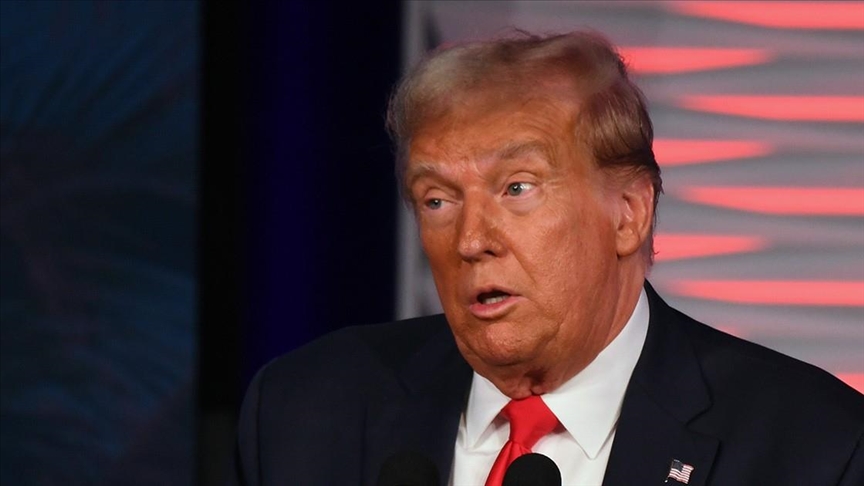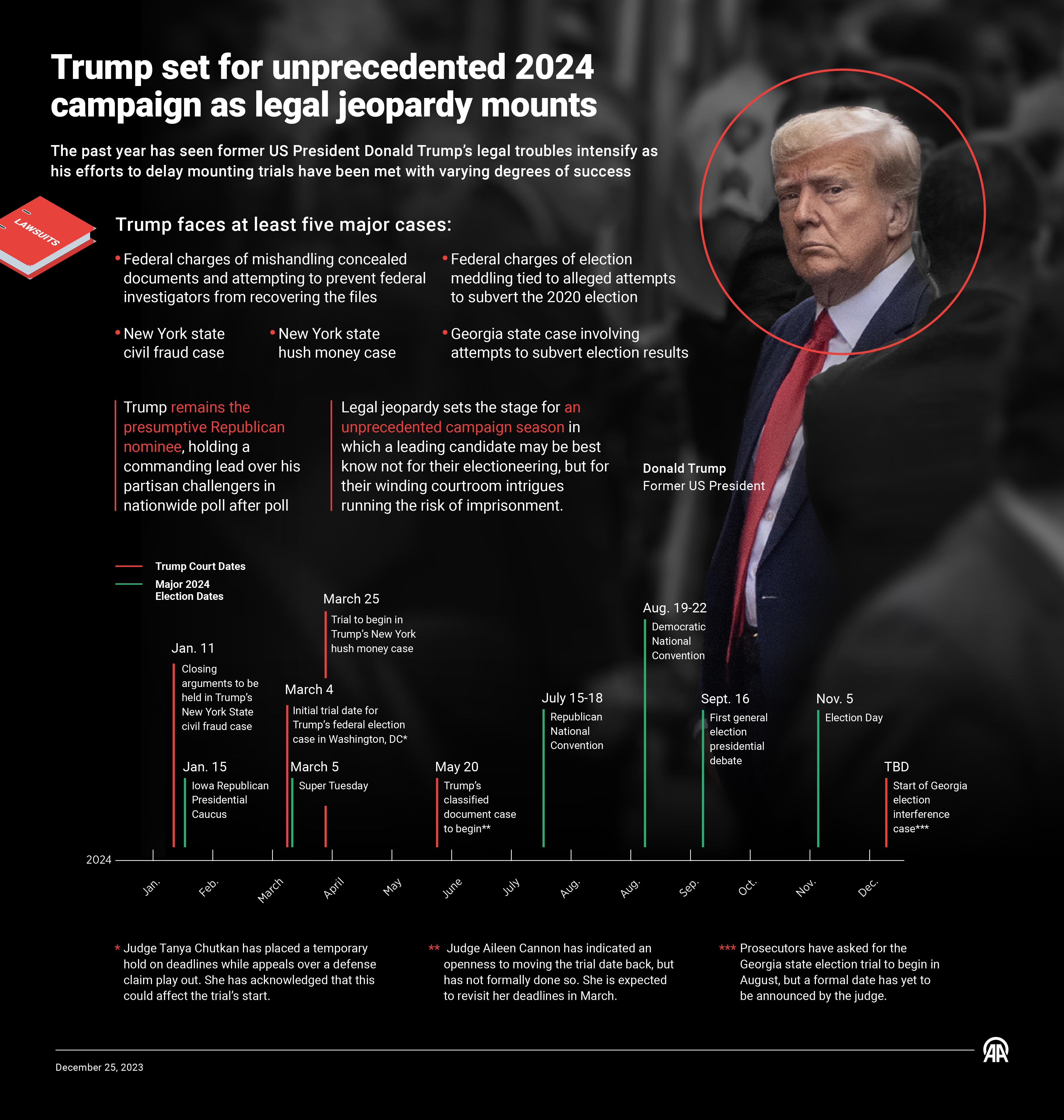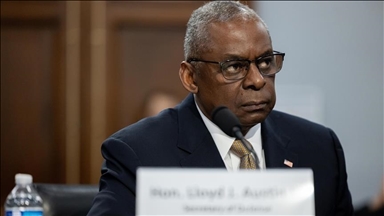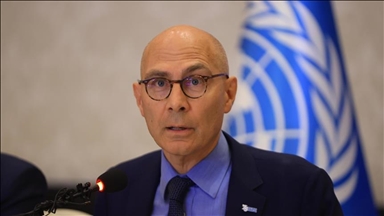 Eski ABD Başkanı Trump, yeniden seçilirse "göçmenleri sınır dışı edeceği" sözünü yineledi
Eski ABD Başkanı Trump, yeniden seçilirse "göçmenleri sınır dışı edeceği" sözünü yineledi
- Former US president faces long list of disparate legal cases, most of which are likely to bookend the 2024 campaign season
- 5 major cases await presumptive Republican nominee at the state and federal levels, including election interference, hush money payments, mishandling classified US documents, and illegal business practices
- Legal jeopardy sets stage for unprecedented campaign season where a leading candidate may be best know not for their electioneering, but for winding courtroom intrigues running the risk of imprisonment
WASHINGTON
The past year has seen former US President Donald Trump’s legal troubles intensify as his efforts to delay mounting trials have been met with varying degrees of success.
Trump now faces at least five major cases that include charges of election interference at the state and federal levels, hush money payments, mishandling classified US documents, and illegal business practices. At each juncture, his legal team has sought to draw out the proceedings by requesting procedural delays, or requesting timelines that would have deferred the trial's start, sometimes until well after the 2024 election in November.
Trump remains the presumptive Republican nominee, holding a commanding lead over his partisan challengers in nationwide polling.
Republicans will kick off their primary season when they hold their first nominating contest in Iowa on Jan. 15. That will include public gatherings, known as caucuses, where people will gather to discuss and vote on a candidate.
But Trump's legal jeopardy has set the stage for an unprecedented campaign season in which a leading candidate may not be best-known for their electioneering, but instead by winding courtroom intrigues that risk imprisonment.
Here is a look at the cases against the ex-commander-in-chief, and their implications for a likely unprecedented campaign season.
Closing arguments in New York state civil fraud case to be held next month
This is the only case against Trump that has gone to trial in 2023. The lawsuit was brought by New York Attorney General Letitia James. It centers on whether Trump overvalued his properties to secure preferential loan terms from banks, while undervaluing them when reporting to state authorities to skirt taxes.
Justice Arthur Engoron on Monday rejected Trump's effort to have the case concluded with a verdict in his favor after prosecutors with James' office completed 11 weeks of arguments.
At stake is the future of Trump's business empire in New York, where he turned his name into a national symbol of wealth and prosperity. Engoron has already found Trump, his sons, and his business liable for fraud. The trial is to determine whether Trump's business empire will be dissolved, and to what extent they will have to pay financial penalties.
"While the judge already ruled in our favor and found that Donald Trump engaged in years of significant fraud and unjustly enriched himself and his family, this trial revealed the full extent of that fraud — and the defendants' inability to disprove it," James said in a statement.
As with the other cases against him, Trump has denied wrongdoing, maintaining that the legal challenges against him are part of an orchestrated campaign of "election interference," and a "witch hunt."
Trump's legal team did not request a jury trial, making Engoron the final decision-maker in a case that could lead to Trump being barred from running a business in New York state. Closing arguments are expected on Jan. 11, with each side facing a Jan. 5 deadline for filing their final briefs.

New York also home to unfolding hush money case
Trump separately faces prosecution on 34 counts of falsifying business records in connection with hush money payments made to adult film star Stormy Daniels and Playboy model Karen McDougal. Both have alleged extramarital affairs with Trump.
The payments were made during Trump's first White House run, which began in 2015.
Prosecutors have alleged that Trump attempted to conceal them by writing them down as retainer fees to Trump's former longtime attorney Michael Cohen. Those fees, prosecutors say, were actually reimbursements for Cohen paying off the women over the course of a year.
Cohen, who has fallen out with Trump, testified before the grand jury that brought the charges, and is expected to be the prosecution's star witness.
The case marked the first time an ex-president was criminally charged after leaving office. Each count carries a punishment of up to four years behind bars if Trump is convicted.
His attorneys have since dropped efforts to have the case moved to federal court. A trial date has been set for March 25.
Election meddling, mishandling of classified documents at center of federal cases against Trump
Meanwhile, Special Counsel Jack Smith is prosecuting two cases against Trump in federal court that center on whether Trump criminally interfered in the 2020 election, as well as his handling of classified US documents after he left office in January 2021.
Trump's legal team has been trying to get the election interference case thrown out on claims of presidential immunity. The judge in the case, Tanya Chutkan, rejected the claim, prompting an appeal from Trump's legal team.
Smith, however, asked the Supreme Court to quickly take up the matter in an effort to preserve the looming March 4 trial date in Washington.
Chutkan has temporarily frozen the trial’s start date, and all other deadlines, as the appeals over presidential immunity play out. The judge has acknowledged that the pause could affect the start of the trial.
The Supreme Court asked Trump's legal team to explain last week why they believe the court should not agree to take up the case ahead of a decision from the appellate court. In a Wednesday filing, they said it should not be fast-tracked because of its unprecedented nature against an ex-president, claiming Trump's actions amounted to "official acts."
The top court apparently agreed, and declined to take up the case for now.
Arguments in the appellate court have been scheduled for Jan. 9.
Smith, a career US attorney, was appointed as a special counsel by Attorney General Merrick Garland in November 2022 in order to grant greater autonomy to prosecutors, and thereby push back on claims of political interference in the heated cases.
In Florida, Smith's office is preparing for the start of a separate trial over Trump's retention of classified documents after he left office, and alleged efforts to conceal them from federal investigators as they sought to retrieve them.
US District Judge Aileen Cannon has set a May 20 start date for the trial to begin, but has appeared open to allowing for a delay due to the sheer volume of evidence put forward by prosecutors, and the competing legal challenges Trump faces.
While Cannon has so far kept the trial on track, she said in November that she would revisit her deadlines in March.
Looming large over the proceedings, however, have been questions of whether Trump could pardon himself if he is reelected and found guilty in the election and/or documents cases. Presidents have the power to pardon individuals for crimes over which they have been convicted, or, as was the case with Richard Nixon, who held office in 1969-1974, prospective crimes for which they may be convicted.
President Gerald Ford, Nixon's successor, pardoned Nixon for any crimes that he may have committed in connection with the Watergate scandal while he was president. Though Nixon was never charged with any wrongdoing, he left office in disgrace.
Georgia state charges center on unpardonable election crimes
Unlike the federal cases, Trump could not pardon himself if he is reelected and convicted of the charges brought in the states of Georgia and New York. Presidential pardon powers only apply to federal crimes, not those at the state or local levels.
Like the federal case, the one in Georgia also centers on charges of election interference. But it only concerns alleged activities conducted in the southern state in a case brought by Fulton County District Attorney Fani Willis.
Trump was charged with a series of election meddling crimes in August.
A state grand jury returned a 41-count indictment against Trump and 18 of his political allies, charging the ex-president with violations of the Georgia state Racketeer Influenced and Corrupt Organizations (RICO) Act, solicitation of violation of oath by a public officer, conspiracy to commit impersonating a public officer, and conspiracy to commit false statements, among other crimes.
Prosecutors proposed last month an Aug. 5 date for the trial to begin, but Trump's team has yet to file its own proposed date. Lawyers have instead asked Fulton County Superior Court Judge Scott McAfee for a hearing on the issue.
It is not clear how McAfee will ultimately respond.
Cases set stage for unprecedented campaign
All of these cases have set the stage for what is likely to be a closely-watched presidential election cycle where the presumptive nominee of a major party is seen as much entering courthouses as he is taking the rostrum at campaign events.
The New York business case is the only one likely not to run into the thick of the heated campaign season, though its date for final arguments is only four days before the Iowa caucuses. That means the judge's ruling could come down right as voters convene in the midwestern state.
The other cases, however, have the potential to bookend, and run through, the July 15 Republican National Convention, when the party will formally announce its nominee, making for an unprecedented campaign season.
Anadolu Agency website contains only a portion of the news stories offered to subscribers in the AA News Broadcasting System (HAS), and in summarized form. Please contact us for subscription options.







